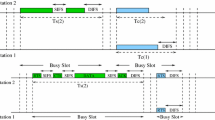Abstract
In practical communication systems, there are always multiple subscribers competing for limited resources, such as time and frequency, hence effective user scheduling is essential to multi-user communications in achieving good system throughput and fairness performance. The conventional proportional fair (PF) scheduling achieves fairness at the cost of system spectral efficiency (SE) loss. Such fairness is of long-term feature, i.e., all the users’ scheduling probabilities become approximately the same only when the observation time is long enough. Therefore, PF cannot guarantee the fairness for subscribers who enter the system temporarily or stay in the system for a short period of time. In addition, delay requirement of real-time-service users can hardly be met with conventional PF. In order to remedy these deficiencies, we propose adaptive proportional fair (APF) scheduling algorithms. In each time slot, the infrastructure node, e.g., base station, dynamically adjusts the forgetting factor based on the variance of all the subscribers’ scheduling priorities, so that users’ scheduling weights can be adaptively updated. Our in-depth simulation results show that compared to conventional PF, APF can not only achieve both long-term and short-term fairness which we refer to global-fairness, but also obtain high system SE. Moreover, users’ delay performance can be obviously improved.













Similar content being viewed by others
References
Qualcomm. (2015). 5G - Vision for the next generation of connectivity. [Online]. https://www.qualcomm.com/media/documents/files/whitepaper-5g-vision-for-the-next-generation-of-connectivity.pdf. Accessed 11 Aug 2019.
Tse, D., & Viswanath, P. (2004). Fundamentals of wireless communication. Cambridge: Cambridge University Press.
Nguyen, P. B., & Rao, B. (2015). Optimal fair opportunistic scheduling for wireless systems via classification framework. IEEE Transactions on Cognitive Communications and Networking, 1(2), 185–199.
Lee, H. Y., Kang, M., Jin, S. Y., et al. (2009). The modified proportional fair scheduling algorithms for real-time applications in multiuser multicarrier systems. In Proceedings of IEEE military communications conference (MILCOM) (pp. 1965–1970).
Wengerter, C., Ohlhorst, J., & Von Elbwart A. G. E. (2005). Fairness and throughput analysis for generalized proportional fair frequency scheduling in OFDMA. In Proceedings of IEEE Vehicular Technology Conference (VTC) (pp. 1903–1907).
Proebster, M., Mueller, C., & Bakker, H. (2010). Adaptive fairness control for a proportional fair LTE scheduler. In Proceedings of Personal Indoor and Mobile Radio Communications (PIMRC) (pp. 1504–1509).
Andrews, M., Kumaran, K., Ramanan, K., et al. (2001). Providing quality of service over a shared wireless link. IEEE Communications Magazine, 39(2), 150–154.
Shakkottai, S., & Stolyar, A. L. (2001). Scheduling algorithms for a mixture of real-time and non-real-time data in HDR. Teletraffic Science & Engineering, 4, 793–804.
Sandrasegaran, K., Ramli, H. A. M., & Basukala, R. (2010). Delay-prioritized scheduling (DPS) for real time traffic in 3GPP LTE system. In Proceedings of IEEE Wireless Communications and Networking Conference (WCNC) (pp. 1–6).
Choi, J. G., & Bahk, S. (2007). Cell-throughput analysis of the proportional fair scheduler in the single-cell environment. IEEE Transactions on Vehicular Technology, 56(2), 766–778.
Zhang, G., Li, A., Yang, K., et al. (2016). Energy-efficient power and time-slot allocation for cellular-enabled machine type communications. IEEE Communications Letters, 20(2), 368–371.
Afroz, F., Sandrasegaran, K., & Ghosal, P. (2014). Performance analysis of PF, M-LWDF and EXP/PF packet scheduling algorithms in 3GPP LTE downlink. In Proceedings of Australasian telecommunication networks and applications conference (ATNAC) (pp. 87–92).
3GPP TR 36.913 Release 15. (2018). 3rd Generation partnership project; technical specification group radio access network; requirements for further advancements for evolved universal terrestrial radio access (E-UTRA).
Jalali, A., Padovani, R., & Pankaj, R. (2000). Data throughput of CDMA-HDR a high efficiency-high data rate personal communication wireless system. In Proceedings of IEEE Vehicular Technology Conference (VTC) (pp. 1854–1858).
Hojeij M. R., Nour, C. A., & Farah, J., et al. (2017). Weighted proportional fair scheduling for downlink non-orthogonal multiple access. [Online]. Retrieved from https://arxiv.org/abs/1710.10857. Accessed 18 Dec 2017.
Sediq, A. B., Gohary, R. H., Schoenen, R., et al. (2013). Optimal tradeoff between sum-rate efficiency and Jain’s fairness index in resource allocation. IEEE Transactions on Wireless Communications, 12(7), 3496–3509.
Golub, G. H., & Van Loan, C. F. (2013). Matrix computations (4th ed.). Baltimore: The John Hopkins University Press.
Lee, J. H., & Wan, C. (2011). Interference alignment by opportunistic user selection in 3-user MIMO interference channels. In Proceedings of IEEE international conference on communications (ICC) (pp. 1–5).
3GPP TR36.931 Release 13. (2016). 3rd Generation partnership project; technical specification group radio access network; evolved universal terrestrial radio access (E-UTRA); radio frequency (RF) requirements for LTE pico node B.
Acknowledgements
This work was supported in part by China 111 Project (B16037); the Fundamental Research Funds for the Central Universities (JB171503); NSFC (61672410, 61802292); the Project of Cyber Security Establishment with Inter University Cooperation; the Secom Science and Technology Foundation.
Author information
Authors and Affiliations
Corresponding author
Additional information
Publisher's Note
Springer Nature remains neutral with regard to jurisdictional claims in published maps and institutional affiliations.
Rights and permissions
About this article
Cite this article
Li, Z., Bai, Y., Liu, J. et al. Adaptive proportional fair scheduling with global-fairness. Wireless Netw 25, 5011–5025 (2019). https://doi.org/10.1007/s11276-019-02108-1
Published:
Issue Date:
DOI: https://doi.org/10.1007/s11276-019-02108-1




